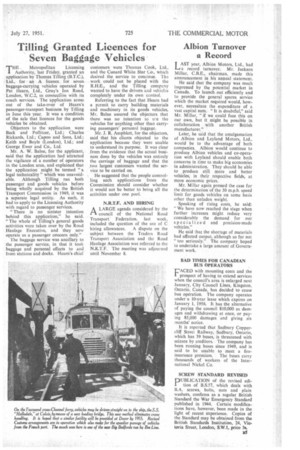Tilling Granted Licences for Seven Baggage Vehicles
Page 39

If you've noticed an error in this article please click here to report it so we can fix it.
THE , Metropolitan Licensing Authority, last Friday, granted an application by Thomas Tilling (B.T.C.), Ltd., for an A licence for seven baggage-carrying vehicles operated by Pat Hearn, Ltd., Gray's Inn Road, London, W.C.2, in connection with its coach services. The application arose out of the take-over of Hearn's passenger-transport business by Tilling in June this year. It was a condition of the sale that licences for the goods vehicles be obtained.
Objectors to the application were Beck and Pollitzer, Ltd.; Charles Rickards, Ltd.; Capon and Sons, Ltd.; Keith and Boyle (London), Ltd.; and George Ewer and Co., Ltd.
Mr. A. W. Balne, for the applicant, said that the application had attracted the vigilance of a number of operators in the 'London area, and explained that the application might be termed "a legal technicality" which was unavoidable. Although Tilling ran both passenger and goods vehicles before being wholly acquired by the British Transport Commission in 1949, it was a separate legal entity. As such, it had to apply to the Licensing Authority with regard to passenger services.
"There is no sinister intention behind this application," he said. " The whole of Tilling's general goods activities were taken over by the Road Haulage Executive, and they now operate as a passenger concern only." The baggage service was ancillary to the passenger service, in that it took baggage and personal effects to and from stations and docks. Hearn's chief customers were Thomas Cook, Ltd., and the Cunard White Star Co., which desired the service to continue. The work could not be placed with the R.H.E., and the Tilling company wanted to have the drivers and vehicles completely under its own control.
Referring to the fact that Hearn had a permit to carry building materials and machinery in its goods vehicles, Mr. Balne assured the objectors that there was no intention to tre the vehicles for anything other than carrying passengers' personal luggage.
Mr. J. R. Amphlett, for the objectors, said that his clients objected to the application because they were unable to understand its purpose. It was clear from the evidence that the actual business done by the vehicles was entirely the carriage of baggage and that the two largest customers wanted the service to be carried on.
He suggested that the people controlling such applications from the Commission should consider whether it would not be better to bring all the activities under one pool.
N.R.T.F. AND HIRING
ALARGE agenda considered by the council of the National Road Transport Federation, last week, included the question of the use of C
hiring allowances. A dispute on the subject between the Traders Road Transport Association and the Road Haulage Association was referred to the N.R.T.F. The meeting was adjourned until November 8.






























































































